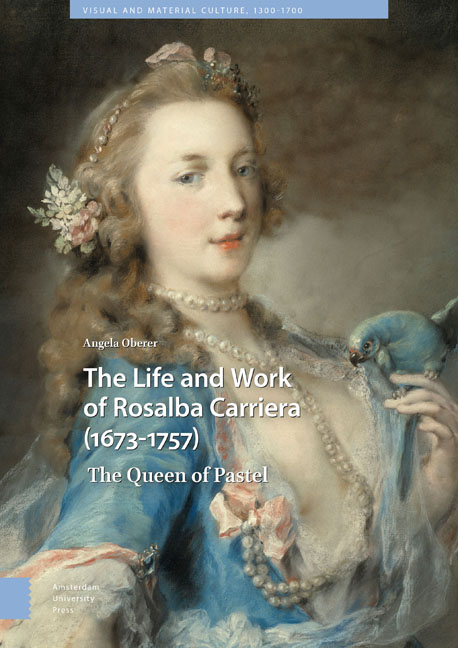Book contents
- Frontmatter
- Contents
- List of Figures and Plates
- Introduction
- 1 Rosalba Carriera – An Independent Single Artist in Eighteenth-Century Venice
- 2 Carriera's Discovery of Pastel Painting
- 3 Carriera's International Network
- 4 Carriera's Stay in Paris
- 5 Carriera's Oeuvre in Pastel
- 6 The Single Woman, the Spinster
- 7 Carriera's Last Journeys – The End of an E`nviable Career
- 8 Carriera's Ways of Self-Fashioning
- Conclusion
- Bibliography
- Index
1 - Rosalba Carriera – An Independent Single Artist in Eighteenth-Century Venice
Published online by Cambridge University Press: 24 November 2020
- Frontmatter
- Contents
- List of Figures and Plates
- Introduction
- 1 Rosalba Carriera – An Independent Single Artist in Eighteenth-Century Venice
- 2 Carriera's Discovery of Pastel Painting
- 3 Carriera's International Network
- 4 Carriera's Stay in Paris
- 5 Carriera's Oeuvre in Pastel
- 6 The Single Woman, the Spinster
- 7 Carriera's Last Journeys – The End of an E`nviable Career
- 8 Carriera's Ways of Self-Fashioning
- Conclusion
- Bibliography
- Index
Summary
Even during her lifetime, Rosalba Carriera was celebrated, not only as the most important woman artist of Italy, but also as the most renowned female painter in all of Europe. Numerous letters from home and from abroad bear witness to her status and contain boundless recognition and admiration; everywhere hymns were sung in praise of her skill and her personality, often in lofty and impassioned language: ‘Not without due cause is Signora Rosalba valued as an ornament of Italy, and Europe’s foremost female artist’, ‘She fills Europe with her works’, ‘[Rosalba is] one of the brightest lights in painting that your Italy has ever given us’, ‘[…] the glory of her sex’, ‘the most talented female artist of our century.’ During the eighteenth century, her international reputation and fame grew to the point that the father of Johann Wolfgang von Goethe (1749–1832), Johann Caspar Goethe, and the French artist, engraver and writer Charles-Nicolas Cochin (1715–1790) referred to her simply as ‘Signora Rosalba’ or ‘Mademoiselle Rosalba’. It had long since become unnecessary to add her surname in order to identify her. Even at the beginning of the twentieth century an art historian echoed a similar euphoria: ‘the once all-admired Venetian diva, […] at whose feet the gentility lay – not only from her home country, but also from all cultivated states in the Europe of her time – languishing for the work of her palette.’
Carriera's Early Years
Rosalba Carriera was born on Rio di San Barnaba in the Contrada di San Basilio in Venice on 12 January 1673 to Alba Foresti (1655–1738) and Andrea Carriera (1645– 1719). Her father was himself the son of a painter, Costantino from Loreo, but instead of following his father's devotion to art, Andrea earned a living for his family as a lawyer. Historians describe Andrea Carriera as a slightly insecure, latently timorous man. After beginning his career in the civil service in Venice as a cancelliere (government employee), he was promoted by 1701 at the latest to capitano and vicario, which required that he work for extended periods of time in Aviano in the north-east area of Italy called Friuli. During the second half of 1671, Andrea married Alba Foresti, daughter of Don Anzolo Foresti.
- Type
- Chapter
- Information
- Life and Work of Rosalba Carriera (1673–1757)The Queen of Pastel, pp. 27 - 96Publisher: Amsterdam University PressPrint publication year: 2020

